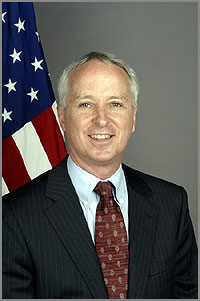US reduces Belgrade staff after embassy attack
Saturday, February 23, 2008

The US State Department is withdrawing non-essential personnel and family members of U.S. diplomats from Belgrade after Thursday's mob attack on the U.S. embassy there. Serbian authorities have pledged there will be no repeat of the incident, in which members of a crowd protesting U.S. Kosovo policy burned part of the embassy.
The draw-down of the diplomatic presence in Belgrade came at the request of U.S. ambassador to Serbia, Cameron Munter, who says the embassy cannot be sufficiently confident of the safety of its personnel after Thursday's attack.
Some participants in a mass demonstration against the recognition of Kosovo independence by the United States and other countries broke into the U.S. embassy compound Thursday evening and firebombed part of the chancery building.
The State Department formally protested over what it said had been a "completely inadequate" security presence around the embassy in central Belgrade.
In a talk with reporters Friday, State Department Spokesman Sean McCormack said it is still unclear if the security lapse on the part of Serbian authorities was deliberate or inadvertent. He noted that in any case Serbian President Boris Tadic and other officials have promised no repeat of the incident:
"The bottom line is the [security] preparations and the actions were inadequate when this mob attacked the embassy. But we have heard, on the positive side, from Serbian government officials in public now that they will not allow this to happen again. And it is worth noting that it was not just our embassy that was attacked. There were other embassies in the vicinity that were also attacked."
At the White House, Spokesman Scott Stanzel attributed the attack to what he termed "hooligans and thugs" and said U.S. officials do not believe the mob action is the face Serbia wants to present to the world.
He also said despite the embassy assault and broader Serb anger over Kosovo recognition, the United States still wants to continue working to integrate Serbia into European institutions.
Serbia has received diplomatic support in its opposition to Kosovo recognition from Russia, which contends that allowing the majority ethnic-Albanian former Serb province to break away will encourage other separatist movements.
Officials at the State Department say Moscow is entitled to its opinion, but they have taken strong exception to a remark Friday by Russian envoy to NATO Dmitry Rogozin, who said Moscow might have make a show of "brute military force" somewhere to win back respect after being rebuffed on Kosovo.
U.S. Undersecretary of State for Political Affairs Nicholas Burns called the Rogozin remarks highly irresponsible and said they should be repudiated by Moscow.
Another senior official at the US State Department told reporters that Rogozin, a former Russian parliamentarian, has record of incendiary rhetoric and that there have been no such threatening comments from senior members of the Russian government, despite their views on Kosovo.
Related news
- "Belgrade: demonstration against independent Kosovo escalates into riots" — Wikinews, February 21, 2008
- "Serbian ambassador recalled from U.S. after recognition of Kosovo" — Wikinews, February 18, 2008
- "Kosovo seeks recognition as independent state" — Wikinews, February 18, 2008
- "Kosovo declares independence from Serbia" — Wikinews, February 17, 2008
Sources
- "US to evacuate staff from Serbia" — BBC News Online, February 22, 2008
- Mu Xuequan. "U.S. envoy asks to evacuate some diplomats out of Belgrade" — Chinaview.cn, February 22, 2008



